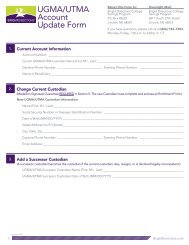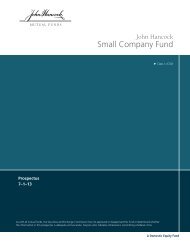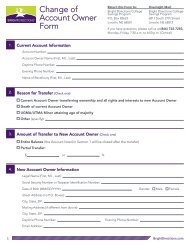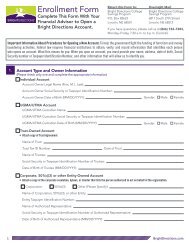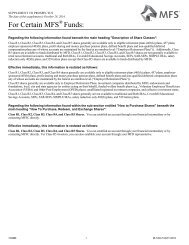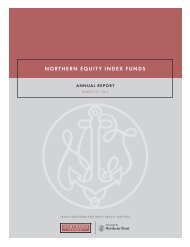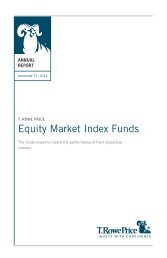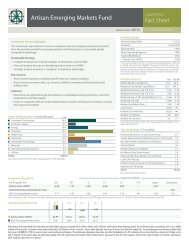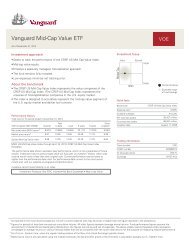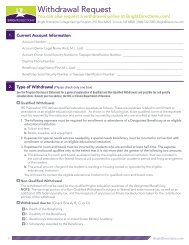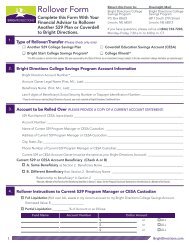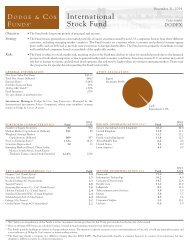Dodge & Cox Funds Statutoary Prospectus dated May 1, 2013
Dodge & Cox Funds Statutoary Prospectus dated May 1, 2013
Dodge & Cox Funds Statutoary Prospectus dated May 1, 2013
You also want an ePaper? Increase the reach of your titles
YUMPU automatically turns print PDFs into web optimized ePapers that Google loves.
PRICING OF SHARESThe share price (net asset value per share or NAV) for aFund is calculated as of the close of trading on the NYSE(generally 4 p.m. ET) each day the NYSE is open forbusiness. The NAV is calculated by dividing Fund netassets (i.e. total assets minus total liabilities) by thenumber of shares outstanding. For purposes of determiningthe NAV, security transactions are normally recorded onebusiness day after the trade date.If a Fund, or its authorized agent or sub-agent,receives your request in good order by the close of tradingon the NYSE (generally 4 p.m. ET), your transactions willbe priced at that day’s NAV. If your request is receivedafter the NYSE close, it will be priced at the next businessday’s NAV.A Fund cannot accept orders that request a particularday or price for your transaction or any other specialconditions. The time at which transactions and shares arepriced and the time until which orders are accepted maybe changed in case of an emergency or if the NYSE closesat a time other than 4 p.m. ET.Some securities may be listed on foreign exchangesthat are open on days (such as U.S. holidays) when the<strong>Funds</strong> do not calculate their NAVs. This could cause thevalue of a Fund’s portfolio investments to be affected bytrading on days when you cannot buy or sell shares.For purposes of calculating the NAV, portfoliosecurities and other financial instruments for whichmarket quotes are readily available are valued at marketvalue. Listed securities are generally valued using theofficial quoted close price or the last sale on the exchangethat is determined to be the primary market for thesecurity. Debt securities and non-exchange tradedderivatives are valued based on prices received fromindependent pricing services which utilize both dealersuppliedvaluations and pricing models. Exchange-tradedderivatives are valued at the settlement price determinedby the relevant exchange.If market quotations are not readily available or if asecurity’s value has materially changed after the close ofthe security’s primary market but before the close oftrading on the NYSE, the security is valued at fair value asdetermined in good faith by or under the direction of the<strong>Funds</strong>’ Board of Trustees. A Fund may use fair valuepricing in calculating its NAV when, for example, (i) theprimary market for a security is closed or if trading of asecurity is suspended or limited, (ii) the Fund determinesthat the price provided by a pricing service is inaccurateor unreliable, or (iii) the Fund determines that asignificant event affecting the value of a security hasoccurred before the close of the NYSE but after the closeof the security’s primary market. An event is consideredsignificant if there is both an affirmative expectation thatthe security’s value will materially change in response tothe event and a reasonable basis for quantifying a resultingchange in value. Because trading in securities on mostforeign exchanges is normally completed before the closeof the NYSE, the value of non-U.S. securities can changeby the time the Fund calculates its NAV. To address thesechanges, the Fund may utilize adjustment factors providedby an independent pricing service to systematically valuenon-U.S. securities at fair value. These adjustment factorsare based on statistical analyses of subsequent movementsand changes in securities indices, specific security prices,and exchange rates in foreign markets. Fair value pricingis intended to reduce potential dilution and other adverseeffects on long-term shareholders of trading practices thatseek to take advantage of “stale” prices, pricinginefficiencies, or otherwise inaccurate prices.Valuing securities at fair value involves greaterreliance on judgment than valuation of securities based onreadily available market quotations. In some instances,lack of information and uncertainty as to the significanceof information may lead to a conclusion that a priorvaluation is the best indication of a security’s presentvalue. When fair value pricing is employed, the prices ofsecurities used by a Fund to calculate its NAV may differfrom quoted or published prices for the same securities. Inaddition, fair values may not reflect the price that a Fundcould obtain for a security if it were to dispose of thatsecurity at the time of pricing.INCOME DIVIDENDS AND CAPITALGAIN DISTRIBUTIONSIncome dividends and capital gain distributions arereinvested in additional Fund shares in your accountunless you select another option on your AccountApplication. The advantage of reinvesting arises fromD ODGE & C OX F UNDS ▪ PAGE 51



